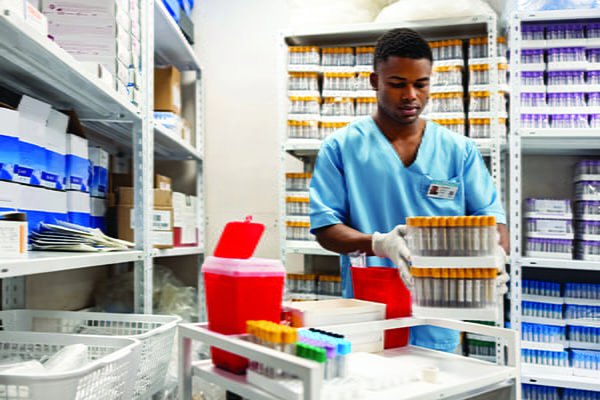
Quest Diagnostics recently announced an agreement to buy select assets of OhioHealth’s outreach laboratory services business.
The transaction will broaden access to cost-effective and innovative laboratory services in Ohio, according to Quest. Providers and patients will benefit from access to Quest’s test menu, network of patient service sites throughout the state, broad health plan coverage, and lower out-of-pocket costs for many services, the company said.
OhioHealth Regional officials said their company has the specialization and scale to ensure its patients have continued access to high-quality lab services that, in many cases, will be more affordable for patients. They added that Quest can deliver meaningful cost savings in lab services without sacrificing quality.
After the acquisition closes, most outreach testing performed by OhioHealth will transition to the Quest Diagnostics full-service laboratory in Pittsburgh, Pennsylvania. OhioHealth will continue to wholly own and operate its hospital labs, providing high-quality laboratory services for inpatient and hospital-based outpatient care as well as anatomic pathology and oncology.
ALZpath announces licensing agreement with Roche for Alzheimer's test
ALZpath, which develops diagnostic tools for Alzheimer’s disease and related dementias, has announced a strategic license agreement with Roche for use of the ALZpath pTau217 antibody to develop and commercialize an Alzheimer's disease (AD) diagnostic blood test, to be offered on the Roche Elecsys platform.
The Roche pTau217 test recently received FDA Breakthrough Device designation and will be commercialized as part of an ongoing collaboration between Roche and Eli Lilly.
pTau217 is a critical blood biomarker for detecting the presence and progression of Alzheimer’s disease. Research has shown that the assay using ALZpath’s pTau217 antibody provides the same accuracy and reliability as more expensive and invasive PET imaging or cerebral spinal fluid testing while being more affordable, and less invasive, ALZpath said.
Researchers advising ALZpath said that incorporating a diagnostic reagent such as the ALZpath pTau217 antibody into widely used diagnostic platforms such as the Roche Elecsys could boost Alzheimer’s disease research, accelerate the evaluation of promising interventions to treat and prevent the disease,
and improve the assessment and care of people with memory problems.
NOWDiagnostics Secures $22.5 Million in Series B Funding
NOWDiagnostics (NOWDx) recently announced it has raised $22.5 million in Series B financing.
Led by DigitalDx Ventures, with notable investors including the Labcorp Venture Fund and Kompass Kapital Management, this oversubscribed funding round will be used to drive the commercialization of at-home diagnostic tests, expand the pipeline of tests, and support strategic hiring initiatives, NOWDx said.
NOWDx’s First To Know Syphilis over-the-counter test, now undergoing Food and Drug Administration (FDA) de novo review, would provide an at-home result in minutes. In addition to the syphilis test, NOWDx has more than 30 diagnostic tests in the clinical research pipeline that have the potential to provide accurate results in minutes.
The patented technology platform that powers NOWDx products is involved in 75 patents issued and pending. The company’s approach allows virtually any immunological assay to be accurately performed in one step at home using a small amount of capillary blood, yielding results in minutes. Their platforms also include saliva and plasma test technologies, enabling rapid testing at home without needing a blood draw or throat swab, the company said.
Tempus AI announces pricing of initial public offering
Tempus AI recently announced the pricing of its initial public offering of 11,100,000 shares of its Class A common stock.
Tempus focuses on selling genomic diagnostics tests across oncology and other areas, including neuropsychiatry, radiology, and cardiology to clinicians and hospital systems. The company uses artificial intelligence (AI) to interpret medical tests.
The gross proceeds to Tempus from the offering, before deducting underwriting discounts and commissions and other offering expenses payable by Tempus, were expected to be $410.7 million.
Wall Street analysts believe Tempus’s clinical and molecular data library could lead to more powerful diagnostic tools. Before going public, Tempus was on the 202 and 2021 CNBC Disruptor 50 lists, Reuters has reported.
Roche sues Stanford University startup over trade secrets
Roche recently sued Stanford University and medical technology startup Foresight Diagnostics in California federal court, alleging that Foresight improperly used Roche genetic sequencing trade secrets to develop competing cancer detection tests.
At issue is a deal that Roche made with two of Foresight’s founders, who are also Stanford University professors. The professors previously helped establish Capp Medical, which Roche purchased in 2015 to obtain Capp’s genomic cancer detection platform CAPP-Seq, the lawsuit says.
Roche requested an unspecified amount of monetary damages and asked the court to force Stanford and Foresight to provide patent applications that allegedly cover Roche’s technology.
The lawsuit alleges that the two Stanford professors and a third in 2020 secretly cofounded Foresight, which improperly
used CAPP-Seq to develop an expanded approach to capturing and analyzing circulating tumor DNA. The suit also alleges that the professors violated their Roche contract provisions about protecting confidentiality of Roche information, assigning certain inventions to Roche, and disclosing potential conflicts of interest.
A prepared Foresight statement maintains that Stanford owns the patents in dispute. It says that Foresight’s founders created the technology at issue using Stanford’s time and resources, under agreements with Stanford, and that Roche has known that Foresight has had exclusive rights to this intellectual property for many years. It contends that Roche’s litigation is a negotiating tactic. “Foresight intends to vigorously defend this litigation and demonstrate that Roche’s allegations are baseless,” the statement adds.
Stanford neither made a statement about the lawsuit available nor responded to requests for comment.
